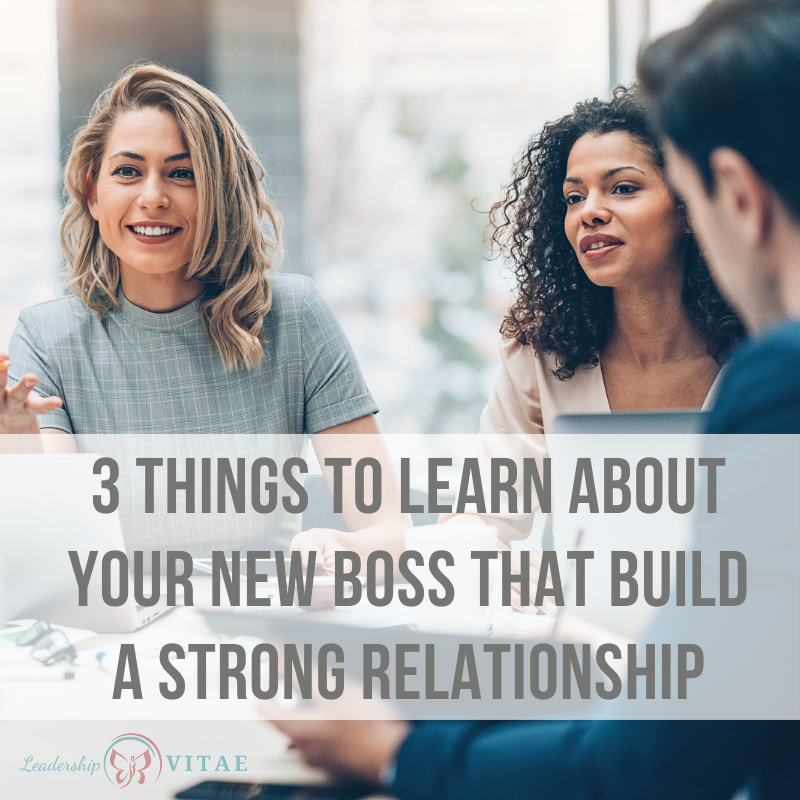
Over the last 30 years, I’ve worked for many people. Marines and civilians, men and women, older and younger. They have come in all sorts of varieties, with many more similarities than differences. Those differences, however, have been key in sorting the extraordinary from the average or challenging.
Sometimes, we are fortunate enough to choose our leader. To interview them as they interview us. Use our experience and discernment to determine upfront whether it will be a good fit.
Even if we select our leader, they can choose (or get asked) to leave. Whether it’s individual-driven change or reorganizations, the result is the dreaded unknown of a new boss.
Given my formative years with the military, and a penchant for digging into new problems, I’m used to my bosses changing with some regularity. For most of my career, I focused exclusively on doing my job, figuring that would build whatever trust and relationship capital I needed when I ran into trouble. Investing in the human being on the other side of the table was not a priority.
In recent years, I realized that I’ve been missing out on an opportunity. A chance to build connection and trust early in the relationship. New bosses often bring in change. I can either be a trusted general at the front of those efforts or reacting to them.
Ever one to be proactive, here are 3 questions I now consider as I meet a new boss.
1. What motivates them?
Understanding what motivates our manager can help us as we navigate the early days of our relationship. We can either ask the question outright (which may or may not get an accurate response in those early days) or watch and listen.
Consider how they frame context. Are answers reflecting company values, the customer, or internal dynamics (aka politics)? Maybe they love challenging work and digging into problems. Or the mission of the company as it relates to customer-centric value creation. Or it could simply be a paycheck.
For good or bad, 9 out of 10 leaders I’ve worked for have been motivated by power, position, and politics. The bad news is that I’m not motivated this way. The good news is that this is a well-established pattern with high predictability.
Since I’m not wired this way, it’s important for me to know when someone is. I can frame risks and opportunities relative to how it will help or hinder an important client or partner. I never care who someone aligns to…just the value of the work. But when my manager cares, I need to know that my work aligns with some specific EVP.
Knowing a manager’s motivations allows us to include those in our pitch when we want their support. If we only pitch what would motivate us and they don’t buy in, we risk getting discouraged.
2. What is their work style?
Everyone works differently. Some like well-planned days. Others are more reactive. I’ve met leaders that want you to come in and have a conversation, and others that want a multi-page powerpoint deck for every discussion.
Knowing the work style helps us align expectations early, particularly when it comes to communication. Rather than assume this manager is like our last, or like us, we can determine how they like to give and receive information or work products.
I’ve met many an executive that likes to stay at 30K feet altitude and ask questions down to maybe 10K feet. If the question is answered well, then back up to 30K. If not, then they can get all the way down to ground level and really dig in. This is a common pattern, but it’s not absolute. It’s valuable to either ask or observe to determine what approach is the right one, because when we get it wrong, both of us can get frustrated.
It’s also important to recognize how we like to show up at work. I have my preferred methods and style but may need to make adjustments. If I’m finding myself getting frustrated because styles don’t align, I have a choice. I can suck it up and either blow up or leave when it gets to be too much, or I can communicate.
A new boss doesn’t mean we completely cede to their style. It means understanding their preferences and our own, determining what we can or are willing to adjust, and communicating ways to meet in the middle so it’s mutually beneficial. If there’s little middle ground, it’s better to accept rather than get frustrated or we’ll be miserable. We can adapt or leave because most people are not going to fundamentally change.
3. What makes them feel like a leader?
This is one I’ve ignored for too much of my career. When I’ve worked for those politically minded individuals in the past, I was quick to dismiss them and their leadership. I just did my job, knowing I made them look good. Many traded my work in for promotions or further responsibilities and I considered my job done at that point.
And yet.
Those same individuals who loved my work struggled with the package it came in. They would find fault, not in my work, but in my person. I was quick to dismiss their personal criticisms as unwarranted and frankly unwelcome because I didn’t respect them anyway.
Huge miss. They were each in a chair that held more responsibility than mine. I learned from the military to respect the rank, even if I didn’t respect the person. This is a leader, for better or worse, so how do they like to lead?
Most people in leadership positions want to help others. To teach and guide. Mentor and coach. Not all, but most of them do. If nothing else than to pass on the knowledge they have so they can consider that they had some part in the work going on in their organizations.
I held that back continually and my managers would look for ways to give me advice. It was often harmful, feeling very personal and targeted at me as a human being, but they were trying to offer leadership in some warped way. I didn’t let them.
So now I ask – how do you see yourself as a leader? And I find opportunities to give them their moments. If they like to problem solve, I’ll bring a problem I don’t feel strongly about to get their input on the solution.
BONUS: What can I learn from them?
I am a life-long learner. I believe leaders must be. Unfortunately, I haven’t always found my learnings in all the spaces I could. Or from all the people.
Too often, when I’ve felt misaligned with my leader from a motivation, style, or leadership perspective, I tuned out all learnings. Well, not all of them. I’ve certainly learned plenty about what NOT to do.
Yet there’s always something we can learn. Even from unlikely sources.
Maybe it’s how to navigate political environments. We may not be political ourselves, and how we choose to navigate may look different. However, if someone knows how to do this better than we do, even taking their insights into consideration can help keep us from stepping in the poop.
If we are quick to reject or dismiss, we miss out on possible learnings and growth this relationship or individual can offer.
The gift of a mutual relationship
No matter who our new boss may be, we can be curious and try to get to know them. In return, we will learn – hopefully a mix of good with anything we perceive could be limiting. Everything we find out is a gift, even if we’re not sure what to do with it yet.
Since relationships are bi-directional, we can offer our own gifts as well. We can respect the chair, grant them the space to lead, and offer empathy for situations they may find themselves in. If we remember that our boss is just as human as we are, it becomes easier to connect, even when we aren’t getting exactly what we might like from the person or relationship. Or don’t agree with decisions or behaviors.
It’s easy to make snap judgments about people. Our fight or flight mechanism can go haywire when we meet a new person with power over our job, pay, and opportunities. It’s harder to quiet the doubt or panic and get to know the person, but it can be so much more rewarding. And nearly impossible to develop a trusting relationship without it.








